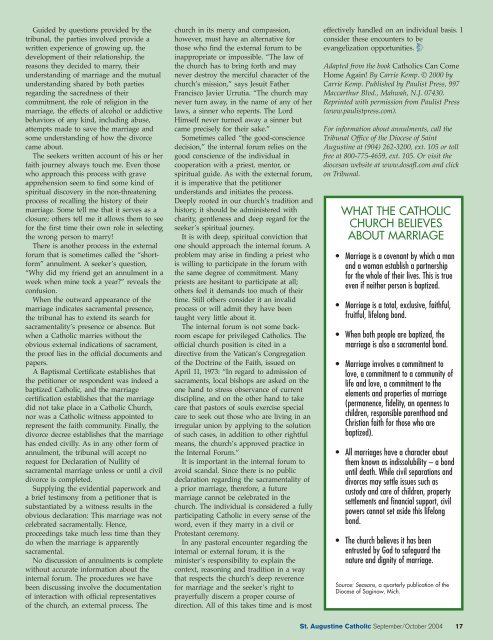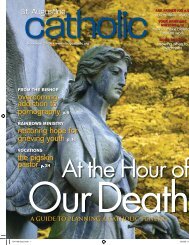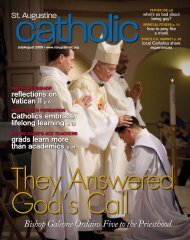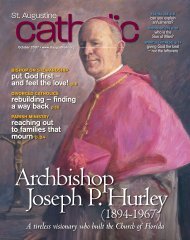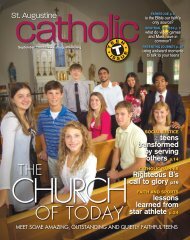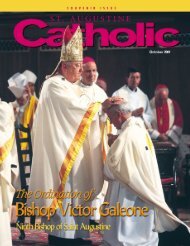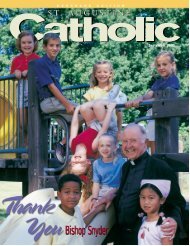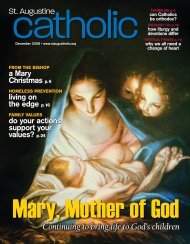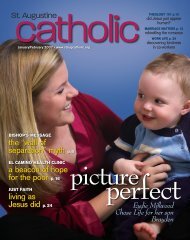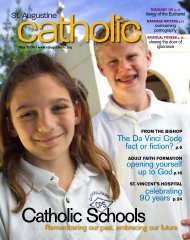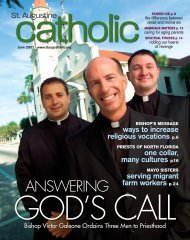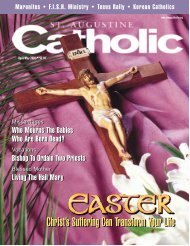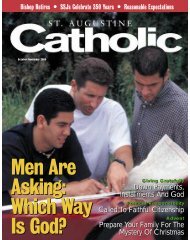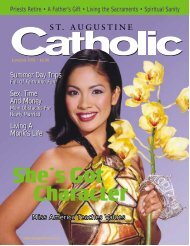A Pastoral Letter By Bishop Galeone A Pastoral Letter By Bishop ...
A Pastoral Letter By Bishop Galeone A Pastoral Letter By Bishop ...
A Pastoral Letter By Bishop Galeone A Pastoral Letter By Bishop ...
Create successful ePaper yourself
Turn your PDF publications into a flip-book with our unique Google optimized e-Paper software.
Guided by questions provided by the<br />
tribunal, the parties involved provide a<br />
written experience of growing up, the<br />
development of their relationship, the<br />
reasons they decided to marry, their<br />
understanding of marriage and the mutual<br />
understanding shared by both parties<br />
regarding the sacredness of their<br />
commitment, the role of religion in the<br />
marriage, the effects of alcohol or addictive<br />
behaviors of any kind, including abuse,<br />
attempts made to save the marriage and<br />
some understanding of how the divorce<br />
came about.<br />
The seekers written account of his or her<br />
faith journey always touch me. Even those<br />
who approach this process with grave<br />
apprehension seem to find some kind of<br />
spiritual discovery in the non-threatening<br />
process of recalling the history of their<br />
marriage. Some tell me that it serves as a<br />
closure; others tell me it allows them to see<br />
for the first time their own role in selecting<br />
the wrong person to marry!<br />
There is another process in the external<br />
forum that is sometimes called the “shortform”<br />
annulment. A seeker’s question,<br />
“Why did my friend get an annulment in a<br />
week when mine took a year?” reveals the<br />
confusion.<br />
When the outward appearance of the<br />
marriage indicates sacramental presence,<br />
the tribunal has to extend its search for<br />
sacramentality’s presence or absence. But<br />
when a Catholic marries without the<br />
obvious external indications of sacrament,<br />
the proof lies in the official documents and<br />
papers.<br />
ABaptismal Certificate establishes that<br />
the petitioner or respondent was indeed a<br />
baptized Catholic, and the marriage<br />
certification establishes that the marriage<br />
did not take place in a Catholic Church,<br />
nor was a Catholic witness appointed to<br />
represent the faith community. Finally, the<br />
divorce decree establishes that the marriage<br />
has ended civilly. As in any other form of<br />
annulment, the tribunal will accept no<br />
request for Declaration of Nullity of<br />
sacramental marriage unless or until a civil<br />
divorce is completed.<br />
Supplying the evidential paperwork and<br />
a brief testimony from a petitioner that is<br />
substantiated by a witness results in the<br />
obvious declaration: This marriage was not<br />
celebrated sacramentally. Hence,<br />
proceedings take much less time than they<br />
do when the marriage is apparently<br />
sacramental.<br />
No discussion of annulments is complete<br />
without accurate information about the<br />
internal forum. The procedures we have<br />
been discussing involve the documentation<br />
of interaction with official representatives<br />
of the church, an external process. The<br />
church in its mercy and compassion,<br />
however, must have an alternative for<br />
those who find the external forum to be<br />
inappropriate or impossible. “The law of<br />
the church has to bring forth and may<br />
never destroy the merciful character of the<br />
church’s mission,” says Jesuit Father<br />
Francisco Javier Urrutia. “The church may<br />
never turn away, in the name of any of her<br />
laws, a sinner who repents. The Lord<br />
Himself never turned away a sinner but<br />
came precisely for their sake.”<br />
Sometimes called “the good-conscience<br />
decision,” the internal forum relies on the<br />
good conscience of the individual in<br />
cooperation with a priest, mentor, or<br />
spiritual guide. As with the external forum,<br />
it is imperative that the petitioner<br />
understands and initiates the process.<br />
Deeply rooted in our church’s tradition and<br />
history, it should be administered with<br />
charity, gentleness and deep regard for the<br />
seeker’s spiritual journey.<br />
It is with deep, spiritual conviction that<br />
one should approach the internal forum. A<br />
problem may arise in finding a priest who<br />
is willing to participate in the forum with<br />
the same degree of commitment. Many<br />
priests are hesitant to participate at all;<br />
others feel it demands too much of their<br />
time. Still others consider it an invalid<br />
process or will admit they have been<br />
taught very little about it.<br />
The internal forum is not some backroom<br />
escape for privileged Catholics. The<br />
official church position is cited in a<br />
directive from the Vatican’s Congregation<br />
of the Doctrine of the Faith, issued on<br />
April 11, 1973: “In regard to admission of<br />
sacraments, local bishops are asked on the<br />
one hand to stress observance of current<br />
discipline, and on the other hand to take<br />
care that pastors of souls exercise special<br />
care to seek out those who are living in an<br />
irregular union by applying to the solution<br />
of such cases, in addition to other rightful<br />
means, the church’s approved practice in<br />
the Internal Forum.”<br />
It is important in the internal forum to<br />
avoid scandal. Since there is no public<br />
declaration regarding the sacramentality of<br />
a prior marriage, therefore, a future<br />
marriage cannot be celebrated in the<br />
church. The individual is considered a fully<br />
participating Catholic in every sense of the<br />
word, even if they marry in a civil or<br />
Protestant ceremony.<br />
In any pastoral encounter regarding the<br />
internal or external forum, it is the<br />
minister’s responsibility to explain the<br />
context, reasoning and tradition in a way<br />
that respects the church’s deep reverence<br />
for marriage and the seeker’s right to<br />
prayerfully discern a proper course of<br />
direction. All of this takes time and is most<br />
effectively handled on an individual basis. I<br />
consider these encounters to be<br />
evangelization opportunities.<br />
Adapted from the book Catholics Can Come<br />
Home Again! <strong>By</strong> Carrie Kemp. © 2000 by<br />
Carrie Kemp. Published by Paulist Press, 997<br />
Maccarthur Blvd., Mahwah, N.J. 07430.<br />
Reprinted with permission from Paulist Press<br />
(www.paulistpress.com).<br />
For information about annulments, call the<br />
Tribunal Office of the Diocese of Saint<br />
Augustine at (904) 262-3200, ext. 105 or toll<br />
free at 800-775-4659, ext. 105. Or visit the<br />
diocesan website at www.dosafl.com and click<br />
on Tribunal.<br />
WHAT THE CATHOLIC<br />
CHURCH BELIEVES<br />
ABOUT MARRIAGE<br />
• Marriage is a covenant by which a man<br />
and a woman establish a partnership<br />
for the whole of their lives. This is true<br />
even if neither person is baptized.<br />
• Marriage is a total, exclusive, faithful,<br />
fruitful, lifelong bond.<br />
• When both people are baptized, the<br />
marriage is also a sacramental bond.<br />
• Marriage involves a commitment to<br />
love, a commitment to a community of<br />
life and love, a commitment to the<br />
elements and properties of marriage<br />
(permanence, fidelity, an openness to<br />
children, responsible parenthood and<br />
Christian faith for those who are<br />
baptized).<br />
• All marriages have a character about<br />
them known as indissolubility – a bond<br />
until death. While civil separations and<br />
divorces may settle issues such as<br />
custody and care of children, property<br />
settlements and financial support, civil<br />
powers cannot set aside this lifelong<br />
bond.<br />
• The church believes it has been<br />
entrusted by God to safeguard the<br />
nature and dignity of marriage.<br />
Source: Seasons, a quarterly publication of the<br />
Diocese of Saginaw, Mich.<br />
St. Augustine Catholic September/October 2004 17


